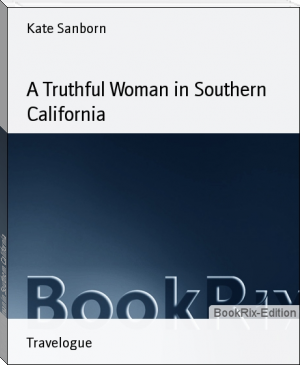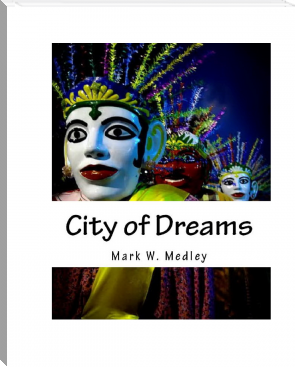A Truthful Woman in Southern California - Kate Sanborn (interesting novels in english .txt) 📗

- Author: Kate Sanborn
Book online «A Truthful Woman in Southern California - Kate Sanborn (interesting novels in english .txt) 📗». Author Kate Sanborn
saddle in place, is woven of hair from horses' manes by a native artisan, and is fully eight inches broad, with a tassel hanging at its middle. The saddle, the bridle, and all its appointments are marvels of beauty. The reins, martingale, and whip are composed of solid silver in woven strands. The headstall is covered with fluted silver, with large engraved silver rosettes at the sides, with decorations of flowers and heads of wheat, with an elaborate nose-piece with silver engraving. The side-pieces are of silver, massive and ornate, with a silver chain under the horse's jaw. The bridle, reins, and accessories weigh about twelve pounds, and are worth not less than two hundred and fifty dollars in value of silver coin used in its manufacture."
Everybody up and down the coast knows Dixie Thompson. His talk is full of delightful anecdotes of the early settlers, and he has a droll, dry humor of his own that is refreshing. Mr. Nordhoff, who is an old friend, once wrote to the Harper "Drawer" about his shrewd way of restraining the over-keen traders and laboring men who tried to impose upon him. He heads the pleasant bit of gossip, "Captain Thompson's Club," and says:
"Captain Dixie is, to all appearance, the man of most leisure in all leisurely Santa Barbara. He and his horses and carriages are always at the service of a friend. But while he seems to be the idlest of men, he is, in fact, an extremely capable business man who has many irons in the fire - tills much good land, has horses and cattle and pigs of the best breeds on many hills and in several rich valleys, and keeps all his affairs running in good order. Still, he is an easy-going, not a bustling, man of business. And it is just here that his social contrivance comes in: he has judged it expedient to form a club.
"'You see,' said he, the other day, to an old friend, 'the boys don't always see me around, and sometimes they try to take a little advantage. I find a fellow who don't haul half a load for me while I am paying for a full load; another one who gives me short measure; or another who does not do what I have told him. I hate to scold; and as they all deny when I accuse them, and I can't be telling men that they are lying to me, I thought I'd just establish a Liars' Club and bring them all in. It is now in good, healthy operation. We don't call it the Liars' Club, of course; we speak of the Club. But when I catch a man trying to 'do' me, I just tell him that I'll have to make him a member of the Club. - Oh, how do you do, Mr. President?' said Captain Dixie to a well-known character just then passing by. - 'He's the president of the Club, you know,' he added. 'Here's Pancho now; I told him the other day I would have to make him a member of the Club if he didn't look out. I guess he'll get in yet. It's a very flourishing club, and more useful, I guess, than some others.'
"Don't laugh, my dear Drawer. I believe Captain Thompson has struck an admirable idea, and one which might well have wide application. Don't you suppose the material for such a club exists, for instance - not here in New Haven, of course, but over in New York, say, or perhaps in Washington? Think it over. The Drawer has always taken the lead in great moral and social improvements. I leave it to you."
Here, as in all Southern California, you will never know anything of the real town unless you have a friend who can take you to unfrequented cross-country drives up winding paths to mesas, or upland pasture guarded by lock and key from the average tourist, and get views indescribably fine.
I am ashamed of my fellow-travellers who pick oranges by the score, and even break off boughs from the choicest and most conspicuous trees, and rush uninvited pell-mell into private grounds and quiet homes of well-bred people to see and exclaim and criticise. Add to this nuisance the fact that hundreds of invalids come yearly to the most desirable localities, turning them into camping-grounds for bacilli. I wonder at the singular forbearance and courtesy of the residents.
Occasionally some one invited to speechify or air his opinion of things in general here bluntly expresses his surprise at finding everywhere so much culture, wealth, and refinement. This is a queer reflection on the fact that this part of the State is filled with specimens of our finest families from the East. I will frankly admit that I must be at my very best to keep up with those I have been privileged to meet here.
You must not forget when in Santa Barbara to visit the fine public library, the best adapted for the convenience of actual workers of any I have entered. You must not fail to drive to Montecito ("little forest"), to Carpenteria and Goleta.
I also advise you to spend a morning in Mr. Ford's studio, and an afternoon with Mr. Starke and his treasures in wood-carving and inlaying, brought yearly from the Yosemite, wrought out with his own hands. He uses nearly fifty varieties of trees in his woodwork, and few see his stock and go away without investing in a redwood cane, a paper-knife, or an inlaid table. His orders come from all parts of the world, and are often very large, mounting up to hundreds of dollars. He is a simple-hearted student of nature, and a thorough workman. I enjoyed a brief visit to Chinatown and Spanishtown close by, where I saw a woman scrubbing clothes on a long flat board, with a piece of soap in each hand, standing in a hut made of poles covered with brush, and noticed an old oven outdoors and the meat hung up in strips to dry. I enjoyed also a call on the old fellow who "catcha de fisha."
And now, looking back as we are whirled away, I find I am repeating those lines from Shelley which so exactly reproduce the picture:
"The earth and ocean seem
To sleep in one another's arms and dream
Of waves, flowers, clouds, woods, rocks, and all that we
Read in their smiles, and call reality."
CHAPTER XIV.
AU REVOIR.
Just as a woman is leaving her friends she ever has the most to chatter about. How can I say au revoir briefly when there is so much more to tell? I so earnestly want to give California en verdad , or in truth. There has been too much bragging from the settlers, as in 1887 the Los Angeles Herald said that "New York would soon be excelled by that city." There is a general desire to surpass all the rest of the world in as many ways as possible, and a general belief that it can easily be done. And visitors have omitted all that was unpleasant, and exaggerated the good points, so that one Californian speaks "of the dancing dervishes of travel, singing insanely from the moment they come to us."
There is so much that is novel in this wonderland that it is hard to keep cool and look at all sides. In 1870 all vegetables and grain were imported. Mr. Webster declared long ago in Congress that California was absolutely worthless except for mining and grazing. The rancheros thought the land only fit for sheep to roam over. Now great train-loads of vegetables and grain leave daily for the East; all the earliest fruit of New York, Boston, and Chicago comes from this State, and ships are carrying all these products to all parts of the world. From north to south the State measures over 800 miles - as far as from New York to Florida - with an area of 189,000 square miles - as much as New England and the Middle States combined, throwing in Maryland. The northern and southern portions are as unlike as Massachusetts and Florida, and the State must soon be divided. How little is known of Northern California! Next year I hope to describe that, with its lofty mountains, wonderful scenery, lakes of rare beauty, immense interests in grain, fruits, and mining. This little bit along the coast is but a minute portion of the whole. I have only followed in the footsteps of the Fathers, and would like to take you to Monterey, where Junipero Serra founded his last mission. Mrs. Stanford has placed a statue of the dear old saint on the shore to honor his life-work. Realizing the size of the State and its capabilities, big stories seem inevitable. As Talleyrand said of Spain, "It is a country in which two and two make five."
Some statements need to be modified. It is declared over and over that here there are no thunderstorms. In the Examiner of May 19th I read: "Santa Rosa was visited by a very severe electrical storm about eleven o'clock last night. The sky was brilliantly illuminated by lightning, and peal after peal of heavy thunder was heard. This was followed by a rain which continued until near morning." A church steeple was struck by lightning and destroyed. This is unusual, but for "never" read "hardly ever." No mad dogs, yet a little terrier I bought in San Francisco to give to a friend had to be shot its first summer on account of rabies. Let us balance matters:
No malaria, but rheumatism. No cyclones, " wind and sand storms. No thunderstorms, " earthquakes. No mad dogs, " rattlesnakes and centipedes, tarantulas and
scorpions. No sunstrokes, " chilling fogs.
All goes when the sun goes. The climate is "outdoors." A sunny room is essential. The difference between noonday and midnight, temperature between sun and shade, is something to be learned and guarded against.
Each place is recommended by doctors who have regained their own health as the place for invalids. What Dr. Edwards says of San Diego is repeated everywhere else by experts:
"San Diego presents the most even climate, the largest proportion of fair, clear days, a sandy and absorbent soil, and the minimum amount of atmospheric moisture - all the factors requisite in a perfect climate."
In each " peripheral resistances are reduced to a minimum ." Dr. Radebaugh, of Pasadena, who, I believe, has not the normal amount of lung but has been restored to health by the air of Pasadena, where he has a large practice, assures me that, in his candid opinion, "Pasadena is the greatest all-the-year-round health-resort in the world." Dr. Isham, of same place, goes into details, and is almost the only physician I have consulted who acknowledges drawbacks in the Pasadena climate for those who desire a cure for throat or lungs. "This climate, like all else here, is paradoxical and contradictory," and he mentions that the winds blowing from the Pacific are not usually the rain-bearers, but those blowing from a point directly opposite, and that the arid desert. Among objectionable features he mentions the "marked changes of temperature daily, frequent
Everybody up and down the coast knows Dixie Thompson. His talk is full of delightful anecdotes of the early settlers, and he has a droll, dry humor of his own that is refreshing. Mr. Nordhoff, who is an old friend, once wrote to the Harper "Drawer" about his shrewd way of restraining the over-keen traders and laboring men who tried to impose upon him. He heads the pleasant bit of gossip, "Captain Thompson's Club," and says:
"Captain Dixie is, to all appearance, the man of most leisure in all leisurely Santa Barbara. He and his horses and carriages are always at the service of a friend. But while he seems to be the idlest of men, he is, in fact, an extremely capable business man who has many irons in the fire - tills much good land, has horses and cattle and pigs of the best breeds on many hills and in several rich valleys, and keeps all his affairs running in good order. Still, he is an easy-going, not a bustling, man of business. And it is just here that his social contrivance comes in: he has judged it expedient to form a club.
"'You see,' said he, the other day, to an old friend, 'the boys don't always see me around, and sometimes they try to take a little advantage. I find a fellow who don't haul half a load for me while I am paying for a full load; another one who gives me short measure; or another who does not do what I have told him. I hate to scold; and as they all deny when I accuse them, and I can't be telling men that they are lying to me, I thought I'd just establish a Liars' Club and bring them all in. It is now in good, healthy operation. We don't call it the Liars' Club, of course; we speak of the Club. But when I catch a man trying to 'do' me, I just tell him that I'll have to make him a member of the Club. - Oh, how do you do, Mr. President?' said Captain Dixie to a well-known character just then passing by. - 'He's the president of the Club, you know,' he added. 'Here's Pancho now; I told him the other day I would have to make him a member of the Club if he didn't look out. I guess he'll get in yet. It's a very flourishing club, and more useful, I guess, than some others.'
"Don't laugh, my dear Drawer. I believe Captain Thompson has struck an admirable idea, and one which might well have wide application. Don't you suppose the material for such a club exists, for instance - not here in New Haven, of course, but over in New York, say, or perhaps in Washington? Think it over. The Drawer has always taken the lead in great moral and social improvements. I leave it to you."
Here, as in all Southern California, you will never know anything of the real town unless you have a friend who can take you to unfrequented cross-country drives up winding paths to mesas, or upland pasture guarded by lock and key from the average tourist, and get views indescribably fine.
I am ashamed of my fellow-travellers who pick oranges by the score, and even break off boughs from the choicest and most conspicuous trees, and rush uninvited pell-mell into private grounds and quiet homes of well-bred people to see and exclaim and criticise. Add to this nuisance the fact that hundreds of invalids come yearly to the most desirable localities, turning them into camping-grounds for bacilli. I wonder at the singular forbearance and courtesy of the residents.
Occasionally some one invited to speechify or air his opinion of things in general here bluntly expresses his surprise at finding everywhere so much culture, wealth, and refinement. This is a queer reflection on the fact that this part of the State is filled with specimens of our finest families from the East. I will frankly admit that I must be at my very best to keep up with those I have been privileged to meet here.
You must not forget when in Santa Barbara to visit the fine public library, the best adapted for the convenience of actual workers of any I have entered. You must not fail to drive to Montecito ("little forest"), to Carpenteria and Goleta.
I also advise you to spend a morning in Mr. Ford's studio, and an afternoon with Mr. Starke and his treasures in wood-carving and inlaying, brought yearly from the Yosemite, wrought out with his own hands. He uses nearly fifty varieties of trees in his woodwork, and few see his stock and go away without investing in a redwood cane, a paper-knife, or an inlaid table. His orders come from all parts of the world, and are often very large, mounting up to hundreds of dollars. He is a simple-hearted student of nature, and a thorough workman. I enjoyed a brief visit to Chinatown and Spanishtown close by, where I saw a woman scrubbing clothes on a long flat board, with a piece of soap in each hand, standing in a hut made of poles covered with brush, and noticed an old oven outdoors and the meat hung up in strips to dry. I enjoyed also a call on the old fellow who "catcha de fisha."
And now, looking back as we are whirled away, I find I am repeating those lines from Shelley which so exactly reproduce the picture:
"The earth and ocean seem
To sleep in one another's arms and dream
Of waves, flowers, clouds, woods, rocks, and all that we
Read in their smiles, and call reality."
CHAPTER XIV.
AU REVOIR.
Just as a woman is leaving her friends she ever has the most to chatter about. How can I say au revoir briefly when there is so much more to tell? I so earnestly want to give California en verdad , or in truth. There has been too much bragging from the settlers, as in 1887 the Los Angeles Herald said that "New York would soon be excelled by that city." There is a general desire to surpass all the rest of the world in as many ways as possible, and a general belief that it can easily be done. And visitors have omitted all that was unpleasant, and exaggerated the good points, so that one Californian speaks "of the dancing dervishes of travel, singing insanely from the moment they come to us."
There is so much that is novel in this wonderland that it is hard to keep cool and look at all sides. In 1870 all vegetables and grain were imported. Mr. Webster declared long ago in Congress that California was absolutely worthless except for mining and grazing. The rancheros thought the land only fit for sheep to roam over. Now great train-loads of vegetables and grain leave daily for the East; all the earliest fruit of New York, Boston, and Chicago comes from this State, and ships are carrying all these products to all parts of the world. From north to south the State measures over 800 miles - as far as from New York to Florida - with an area of 189,000 square miles - as much as New England and the Middle States combined, throwing in Maryland. The northern and southern portions are as unlike as Massachusetts and Florida, and the State must soon be divided. How little is known of Northern California! Next year I hope to describe that, with its lofty mountains, wonderful scenery, lakes of rare beauty, immense interests in grain, fruits, and mining. This little bit along the coast is but a minute portion of the whole. I have only followed in the footsteps of the Fathers, and would like to take you to Monterey, where Junipero Serra founded his last mission. Mrs. Stanford has placed a statue of the dear old saint on the shore to honor his life-work. Realizing the size of the State and its capabilities, big stories seem inevitable. As Talleyrand said of Spain, "It is a country in which two and two make five."
Some statements need to be modified. It is declared over and over that here there are no thunderstorms. In the Examiner of May 19th I read: "Santa Rosa was visited by a very severe electrical storm about eleven o'clock last night. The sky was brilliantly illuminated by lightning, and peal after peal of heavy thunder was heard. This was followed by a rain which continued until near morning." A church steeple was struck by lightning and destroyed. This is unusual, but for "never" read "hardly ever." No mad dogs, yet a little terrier I bought in San Francisco to give to a friend had to be shot its first summer on account of rabies. Let us balance matters:
No malaria, but rheumatism. No cyclones, " wind and sand storms. No thunderstorms, " earthquakes. No mad dogs, " rattlesnakes and centipedes, tarantulas and
scorpions. No sunstrokes, " chilling fogs.
All goes when the sun goes. The climate is "outdoors." A sunny room is essential. The difference between noonday and midnight, temperature between sun and shade, is something to be learned and guarded against.
Each place is recommended by doctors who have regained their own health as the place for invalids. What Dr. Edwards says of San Diego is repeated everywhere else by experts:
"San Diego presents the most even climate, the largest proportion of fair, clear days, a sandy and absorbent soil, and the minimum amount of atmospheric moisture - all the factors requisite in a perfect climate."
In each " peripheral resistances are reduced to a minimum ." Dr. Radebaugh, of Pasadena, who, I believe, has not the normal amount of lung but has been restored to health by the air of Pasadena, where he has a large practice, assures me that, in his candid opinion, "Pasadena is the greatest all-the-year-round health-resort in the world." Dr. Isham, of same place, goes into details, and is almost the only physician I have consulted who acknowledges drawbacks in the Pasadena climate for those who desire a cure for throat or lungs. "This climate, like all else here, is paradoxical and contradictory," and he mentions that the winds blowing from the Pacific are not usually the rain-bearers, but those blowing from a point directly opposite, and that the arid desert. Among objectionable features he mentions the "marked changes of temperature daily, frequent
Free e-book «A Truthful Woman in Southern California - Kate Sanborn (interesting novels in english .txt) 📗» - read online now
Similar e-books:





Comments (0)